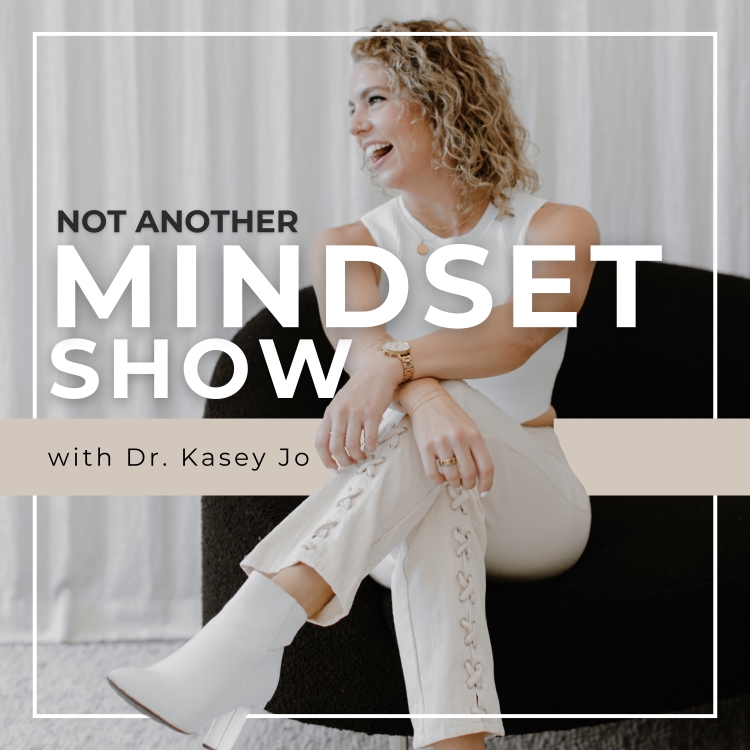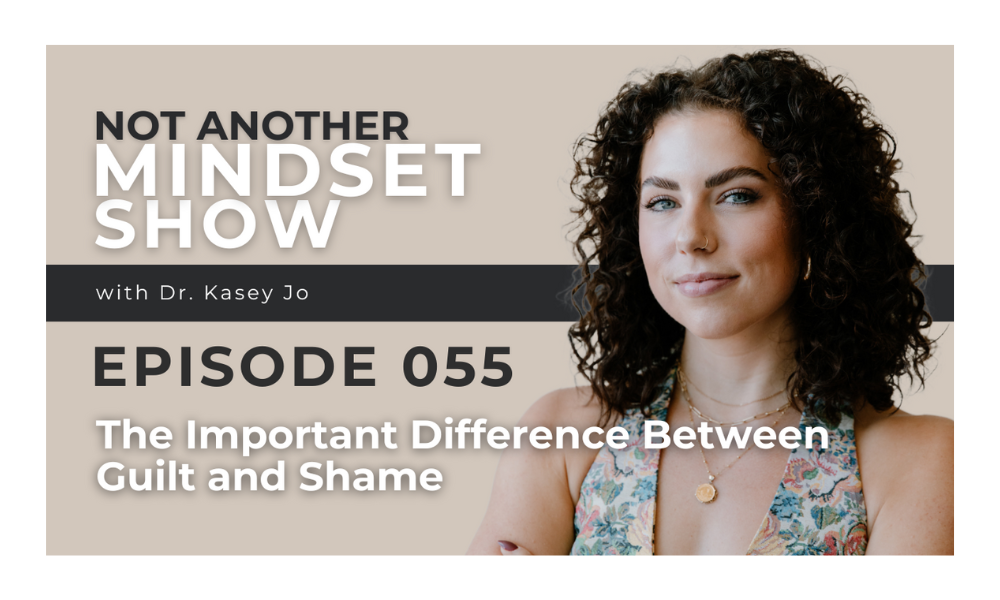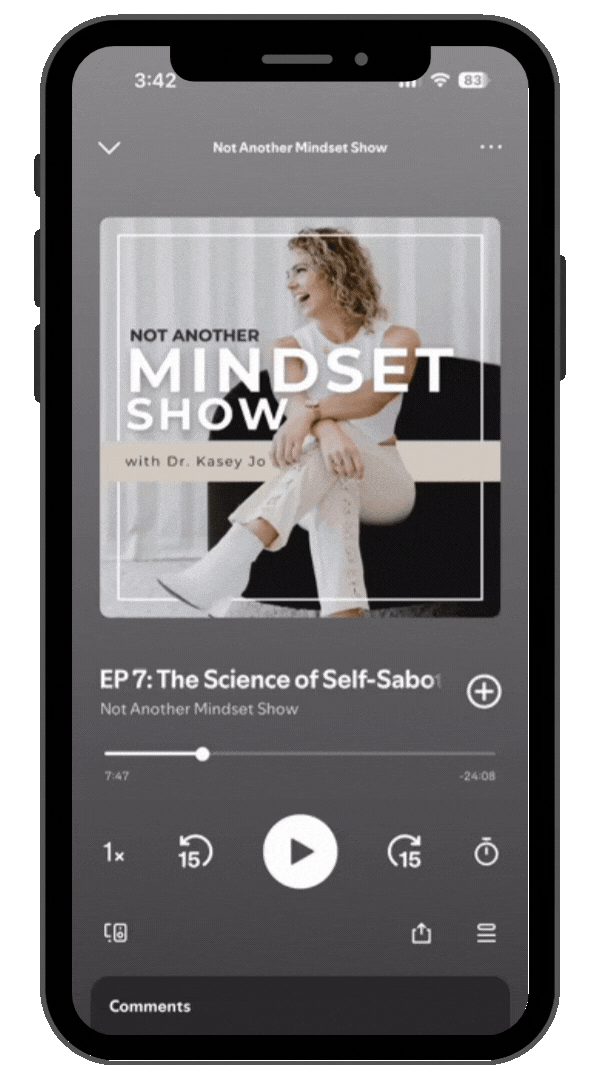How we speak to and about ourselves directly impacts our mindset. Some considerations for fitness coaches.
Our word choice matters, especially when clients talk about feeling guilt and shame.
In this episode, I discuss the differences between feeling guilt and shame. I share how these words impact or come from our mindset, and provide tools fitness coaches can use to guide clients into a growth mindset.
Are you struggling to help clients who are stuck with fixed mindset tendencies?
If you feel like you always have some clients that just keep self-sabotaging and can’t stick to the plan, no matter what you try, you’ll want to get your hands on my 5 FREE lessons in behavior change and mindset. These lessons will help you coach your clients to overcome all-or-nothing thinking and fixed mindsets, stop getting in their own way, develop more self-control, and increase motivation and follow-through.
Episode Highlights
>>(1:35) Is there a difference between guilt and shame? I would say, yes!
>>(4:49) Steal my strategy for handling feelings of guilt and shame with your clients, and even yourself.
>>(6:06) Unpacking a Brene Brown quote that can help when you feel guilty about something.
>>(9:27) What coaches should remember when speaking to clients who are struggling, especially if they express that they feel guilty or feel shame around something that happened.
Listen to the full episode to find out more about the difference between guilt and shame, and what this means for your coaching practice!
Rate, review, and subscribe to my podcast.
If you enjoyed this episode, I’d be incredibly grateful if you could rate and review the show on your favorite platform. Your feedback helps me improve and allows others to discover the show. I want to hear from you whether you’re loving the insights or have suggestions on how I can make the show even better!
Simply scroll down to the review section on Apple Podcasts, Spotify, or wherever you listen, and leave your thoughts. Your support means the world to me and helps me continue to bring you more of the content you enjoy.
Links From the Podcast
Episode mentioned: EP 49: Understanding Stress and Emotional Eating
Want me to answer your questions on my next Q&A episode? Drop your questions here!
Health Mindset Coaching Certification Instagram
Getting started with the Health Mindset Coaching Certification (5 FREE lessons included!)
Episode’s Full Transcript
Hello my friends, and welcome back to not another Mindset show. I’m your host, Dr. Kasey Jo. My goal with this podcast is to take the science of mindset and behavior change and distill it down into actionable takeaways for you. Together we’re gonna unpack research around motivations, self-sabotage, willpower, and so much more, and we’re going to take all of that and translate it into strategies you can immediately apply to your health, fitness, relationships business.
Marketing clients, all of the things. But just to be clear, it’s not all serious and sciency around here. We’re gonna have a ton of fun too, and I’m so excited to share all of this with you. Alright, let’s go ahead and get into the episode. Hello, hello and welcome back. Today we are talking about guilt and shame and is there a difference between the two and if there is a difference, why does it matter?
And. My argument is going to be that it actually matters a lot to understand the difference between these two things and this whole idea for this podcast episode. I feel like I’ve said this so much lately, but I get so many good ideas from the students inside the Health Mindset Coaching certification.
We’re running our 10th round right now. We only open two times per year, and these discussion calls are just so good and really get me thinking about. What I can talk about on the podcast and so many different, yeah, we just, we have such good conversations. So this conversation originated from one of those group calls with my students and we were talking about like when a client says they feel guilty versus when they say that they feel ashamed or they feel shame over something and.
Is there a difference between those two things? And my argument is yes. And also Brene Brown’s argument is yes, and I found some really interesting information from Brene about. The differences between these two constructs, guilt and shame, and it kind of adds to the conversation around where my mind was already going as far as the differences are.
So really when we’re thinking about guilt, it’s a, I feel badly because I did this. Whereas with shame, what we’re looking at is. I feel badly because I am bad. There’s something about me and who I am as a person that is wrong, that is broken, that is bad. Whereas guilt again, is more of a, it’s just based on an action that I took and I am not happy with that action after the fact.
So what I shared on the HMCC call is something I hadn’t really put together before. I. Obviously not surprising to anybody. It’s very much so based on a mindset perspective because guilt is based on action. AKA, something that if you were to change that action next time, you would not feel guilty. Whereas shame is based on how you see yourself.
It’s who you are, which. Is likely something that feels a lot less changeable. That’s just the way it is type of situation. And it feels weird to say this, but guilt is actually because of that more growth mindset coded and shame is more fixed mindset coded. And I say this because growth with a growth mindset.
At the very, like the bare bones definition of a growth mindset is believing that you can change something. Some specific thing, and remember I’ve said this before, but you could have a growth mindset about one thing and believe you can change, improve, and develop that one thing, but that doesn’t mean that you have a growth mindset in everything.
So growth mindset. You believe that you can change something, whereas with a fixed mindset, you don’t believe that you can change something. It’s something that you feel like you’re stuck with. So when we’re talking about guilt, and from my perspective, from this mindset perspective, it’s actually seemingly better to feel guilty than it is to feel shameful because guilt is based on actions and shame is based on who you are as a person.
So with this, you can totally steal all of it and use it with your clients, or please use it with yourself. But if your clients are feeling guilty about something and they’re sharing that with you, you could explain this to them. I mean, I wouldn’t go to them and be like, well, it’s a good thing you don’t feel ashamed, because that would be way worse.
But instead, you can explain to them that guilt is based on an action. You just did something. You made a choice to do something and now you don’t feel great about it. But what’s amazing is all you really have to do is change that action and do differently next time, and then you won’t feel this way, which then could turn into a whole mindset conversation around whether or not they actually believe.
That they can change those actions, that they can do something differently in the future. So it’s a really good like jumping off point for a for mindset work with your clients to kind of position it that way and just see how they respond. So I really love that idea in general. And I know I mentioned Brene Brown at the very beginning of this episode.
And she talks a lot about the difference between shame and guilt in her books. So I actually grabbed a quote from her that I want to read and then unpack with you. So she said, I believe that if we want meaningful and lasting change, we need to get clear on the differences between shame and guilt, which, hey, sounds good to us because that’s exactly what we’re trying to do with our clients, and also do with ourselves.
We want meaningful lasting change. We don’t want just. Change that lasts for 30 days. And then she said that also means moving away from labeling and an end for, from using shame as a tool for change. So shame is a tool for change is something we see in the fitness industry a lot. You know, I mean, this is gonna be extreme examples, but.
Do you hate yourself and what you see in the mirror, then come do this. Or are you tired of feeling that there’s something wrong with you and that’s why you can’t stick with anything? Then come do that. So you see that. We see that a lot, I think a lot less now, but it definitely still exists. And if you take anything away from this podcast episode, please never shame people into working with you.
Because if they feel shameful about themselves after speaking to you, after seeing your content, and then they’re like, okay, you’re right. Like I, I’m ready to do something about this. And then they want to work with you. Because of that, you’re starting the coaching relationship off on such a negative, in such a negative place, and that’s what you can expect from the rest of the coaching relationship as well.
You start negative, it’s going to continue to be negative. So the other part of Brene’s quote is. About how moving, how we should be moving away from labeling and why that’s related to shame is exactly what I was talking about before. Because people see themselves as a certain way and they see that as not good.
So they’re labeling themselves in a way, and I actually discussed this a little bit in a recent episode, the one about emotional eating and shared some results from a study where. People who labeled themselves, they reported that they were emotional eaters were significantly more likely to eat in the face of stressors.
So they’re stressed out. So they go have a stack. They’re they’re stressed, snackers, right? Because they’ve labeled themselves as emotional eaters compared to those who don’t label themselves as emotional eaters. They didn’t have the same problem. In fact, those people were more likely to not eat in times of stress.
And that was the results from one study that I shared. So if that’s interesting to you, definitely go check that episode out. And when we believe who we are as a person is the reason we can’t do something, that is a really tough spot to be in. That is fixed mindset at its finest because I feel like I am this person, so there’s only so much I can do about that.
It’s not necessarily something I can change, like an action. In fact, I am this person, so I take certain actions because of who I am. So. Be cautious here because you might be accidentally assigning labels to your clients without realizing it. For instance, if they are sharing an experience of emotional eating where, Hey, I didn’t hit my macros those days because I was just really stressed out and before I knew it, I was, I had an entire sleeve of Oreos, and that’s why I’m over on my carbs and fats this week.
If you go back to that client and say, okay, well it sounds like you’re an an emotional eater, but they’ve never really seen themselves as that before, it was just an instance of emotional eating. Now they’re going, wow, I have a problem. Who I am is a problem. I am now classifying myself as an emotional eater because my coach called me that.
So be cautious here. When you’re using those types of words, those types of labels with your clients, and of course with all of this, I know I’m saying, okay, well guilt is technically somewhat, it seems better than shame. That doesn’t mean I want you to make your clients feel guilty either. Like, please don’t use guilt in your marketing instead, because Casey said don’t use shame.
So I guess we’ll use guilt, um, and it’s growth mindset coded, so it’s good. That’s not what I’m necessarily saying here either. But instead just to. Pay attention to the words that your clients use. Pay attention to the things that you tell yourself and what that means from a mindset perspective. Because my friends, your beliefs are a reality creation technique, and your beliefs will dictate what actions you take.
So pay attention. Be cautious with your words. Pay attention to the words that your clients are using. Listen to what you’re telling yourself and what you’re telling other people, because it can make a big old difference. I can tell you that much. Okay. Super quick episode this time. I just really wanted to get my thoughts out there to you and I’d be curious to hear what’s coming up because it’s a very just like interesting conversation and you know, it really never is just semantics when we’re talking about mindset.
Words matter. They matter a lot. So I hope you enjoyed this short episode, and I will see you next week. And that’s a wrap for today’s episode of Not another Mindset show. If you enjoyed today’s episode, don’t forget to hit that subscribe button so you get notified of the next one. Because if you’re anything like me, if the episodes aren’t popping up for you automatically, you’ll keep forgetting to come back to the show even if you really, really enjoyed it.
So go ahead and hit that subscribe button and make it super easy for you and of course. If you wanna see more episodes just like this one, I’d love for you to let me know by leaving a review. I know, I know it’s super annoying to do, but the few seconds that it takes means the world to me and also ensures that I can keep providing free education and value to you.
And just to sweeten the deal, I am going to be picking a random reviewer every single month to receive a free workshop or product from me if you’re looking for more free resources. Or just wanna connect, hang out, chat a little bit. Come find me on Instagram. I’m Coach Casey, Joe over there. That is where I hang out the most in the land of social media.
Alright, my friends, that is all I have for you this time. I so appreciate you being here and love to see you prioritizing your growth. I’ll see you next time.




